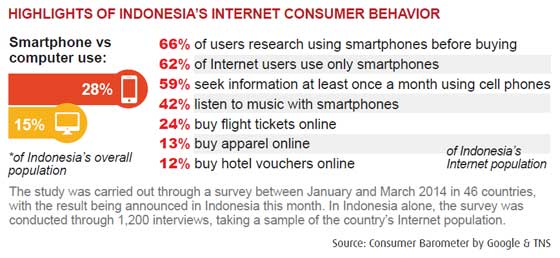MICHELLE VARINATA WRITES – Poverty and wealth; primitive and modern; religious and secular. Indonesia is Asia’s most enigmatic (and somewhat bi-polar) nation filled with socio-economic contradictions. Despite the disparity in wealth, the country has one thing that bonds everyone from all walks of life: technology. Recently, Indonesia has built a reputation for being an extremely tech-savvy nation due to its obsession with the Internet and its incessant smartphone usage.
As mentioned in The Jakarta Post, a survey revealed that Indonesia has 73 million Internet users. Ismail Cawidu, a spokesman for the Communications and Information Ministry, reveals that 58.4% were online for five hours and spent two hours online on handheld devices. In addition, Cawidu divulges that at least 62 million are active on social media while others use their smartphones to look up information, e-mail, and/or play games. It would be rather difficult for Indonesians to follow a tech-lite diet.
Aside from using social media, the Internet-savvy population use their laptops and smartphones as an alternative for brick-and-mortar. In The Jakarta Post, two twenty-somethings were interviewed about their online shopping habits. Twenty-six year-old Yodie Hardiyan revealed that he compares prices between air and train tickets before he makes a purchase. Yodie reasons that buying online is more convenient because it saves a lot of time instead of physically going to the train station or airport and purchasing tickets. Indonesia’s infamous traffic gridlock is another inconvenient and unpleasant factor. Twenty-six year-old Theosa Dinar Swastiningtyas also says that she purchases round-trip tickets online out of pure convenience. However, these twenty-somethings are not alone.
A survey‘s results showed that 24% of Indonesians purchase flight tickets online. Since Indonesians enjoy traveling as one of life’s simple luxuries, using electronic devices are a double-edged sword. As for the cons of using a smartphone, Yodie states that he always makes his final purchases on his laptop when buying travel tickets since the Internet connection on mobile phones or smartphones can get patchy and laptops have better accuracy. On the other hand, Theosa admits that she prefers her mobile tablet since it eases her daily routine and saves her from having to to go a travel agency to purchase tickets.
This new phenomenon of electronic consumption reflects the growth of Indonesia’s middle class, which will rise 55% in 2017. While the middle class is growing, we can only hope that Indonesia’s technology boom can lessen the gap between rich and poor.

